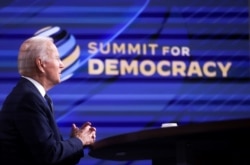U.S. President Joe Biden is hosting the first of two Summits for Democracy this week. According to the White House, the goal is to bring together “a broad and diverse group of governmental and nongovernmental leaders from every region of the world to set forth an affirmative agenda for democratic renewal.”
Beijing reacted harshly to the planned summits for various reasons, including the fact that its claimed island republic, Taiwan, was invited while China was not.
China has questioned the right of the United States to hold such a summit, saying the U.S. response to the COVID-19 pandemic, U.S. military operations abroad and issues of racial injustice undermine the country’s democratic bona fides.
Moreover, Beijing rejects the idea there is a one-size-fits-all model for democracy, insisting that China is a "democratic" country based on the government’s purported commitment to the well-being of the Chinese people.
On December 7, New China Research (NCR), the think tank of China's Xinhua News Agency, released a report on “China's Approach to Democracy, Freedom and Human Rights.”
The white paper argues that the Chinese people have determined that the only criterion for democratic governance is “that ordinary people enjoy the dividends of peace and development and live peaceful and happy lives.”
“The essence of modern state governance is democratic governance,” the paper states. “Well-functioning democracy can guarantee and develop freedom and human rights.”
Therefore, China is democratic, the report argues:
“The word ‘democracy,’ which first appeared in ancient Greece, originally meant ‘rule by the people.' In China, ‘the running of the country by the people’ has become a reality that is increasingly vivid and vigorous.”
Beijing is correct to say that democracy can differ from country to country.
However, it incorrectly equates effective governance, and even legitimate governance, with democratic governance.
Whether China’s government is effective and/or legitimate is another issue. But it is not democratic given the restrictions on participation faced by ordinary Chinese.
The two major forms of democracy are representative democracy, under which the people elect representatives who draft/vote on laws for them; and direct democracy, under which citizens directly vote on laws.
The United States is largely a representative democracy, although 26 U.S. states and Washington, D.C., have initiative and/or veto referendum processes, which are forms of direct democracy.
China does permit limited voter participation in local elections, but there is no democratic input at the national level.
China is essentially a one-party state, ruled by the Chinese Communist Party (CCP). Eight small political parties are allowed to exist under the umbrella of the CCP-run United Front network, but they are not allowed to challenge the CCP.
Likewise, China has an executive branch (the State Council), a legislature (the National People’s Congress), and a judiciary. But all are subordinate to the CCP.
The National People’s Congress (NPC) only meets once a year, and party leaders decide on legislation prior to that session, “leading to the NPC being derisively described as a ‘rubber-stamp’ parliament,” France 24 reported.
Nor are China’s courts independent from the CCP. In 2017, Supreme People’s Court Chief Justice Zhou Qiang warned against autonomous courts:
“[China's courts] must firmly resist the western idea of ‘constitutional democracy,’ ‘separation of powers’ and ‘judicial independence.’ These are erroneous western notions that threaten the leadership of the ruling Communist Party and defame the Chinese socialist path on the rule of law.”
Then there is the issue of civil liberties, which encyclopedia Britannica defines as “freedom from arbitrary interference in one’s pursuits by individuals or by government.”
The Museum of Australian Democracy at Old Parliament House notes that “civil liberties are defended and increased against the encroachment of governments, institutions and powerful forces in society.”
In a true democracy, civil liberties are a necessary limit on government power. They allow for transparency, accountability, and serve as a check against tyranny.
The Universal Declaration of Human Rights lists various civil liberties, including the rights to life, liberty, free speech, free assembly, privacy, and free expression of thought, conscience, and religion.
Within American legal thought, free speech has been viewed as "the guardian of our democracy” and, as U.S. Supreme Court Justice Benjamin Cardozo put it in 1937, the “the matrix, the indispensable condition, of nearly every other form of freedom.” In a democracy, people should be able to speak out against the government without fear of reprisal.
Chinese authorities, however, show little regard for civil liberties.
China officially recognizes five religions, for instance, while banning other religious and spiritual groups.
As the U.S. State Department reported, those who insist on practicing their faith despite state restrictions have been subjected to harassment, arrest, detention, torture, imprisonment and forced indoctrination. In China’s Xinjiang region, Uyghurs and other Muslims minorities are systematically detained for modest expressions of faith.
China also has one of the world’s most restrictive media environments, with access to information strictly curtailed.
Reporters Without Borders recently noted in a report titled “The Great Leap Backwards of Journalism in China” an “acceleration of China’s violations against its own international commitments to freedom of opinion and expression” and an “unprecedented campaign of repression led by the Chinese regime in recent years against journalism and the right to information worldwide.”
According to the Committee to Protect Journalists, China “remains the world’s worst jailer of journalists for the third year in a row, with 50 behind bars.” In its 2021 World Press Freedom Index, Reporters Without Borders ranked China 177th out of 180 countries, only two spots above North Korea.
Beijing has also subjected its citizens to a system of mass surveillance that allows nearly total control. Freedom House, a Washington, D.C., human rights group, wrote in its “Freedom in the World 2021” report:
“The [Chinese] government’s ability to monitor citizens’ lives and communications has increased dramatically in recent years, inhibiting online and offline conversations. Social media applications like WeChat are known to closely monitor user discussions so as to conform with government content restrictions and surveillance requests. Surveillance cameras, increasingly augmented with facial-recognition software, cover many urban areas and public transportation, and are expanding into rural regions.
“The country’s evolving Social Credit System rates citizens’ trustworthiness based on a wide range of data, including financial records, purchasing behavior, video gaming habits, social acquaintances, and adherence to rules in public spaces. Devices used by police to quickly extract and scan data from smartphones, initially deployed in Xinjiang, have spread nationwide.”
Chinese citizens are routinely denied the right to liberty and bodily autonomy, as is evident from reports of forced sterilization, forced labor and mass incarceration of Uyghur Muslims without due process.
As evidence of "democracy," China conflates human rights with the country’s rapid economic growth and gains against poverty in recent decades.
Elsbeth Johnson, senior lecturer at MIT’s Sloan School of Management, and Rana Mitter, professor of history at Oxford, argue that it was wrong to assume that political freedom would arise from capitalism and economic freedom in China.
Many Chinese citizens, they contend, do not believe democracy is necessary for economic success, but do believe “their form of government is legitimate and effective.”







